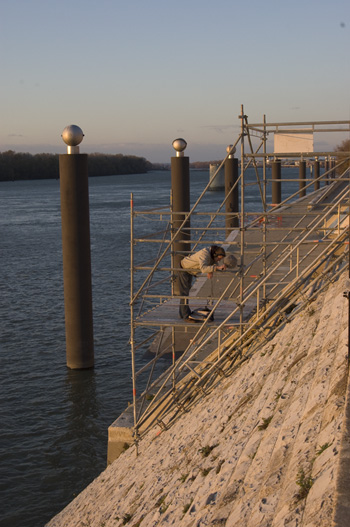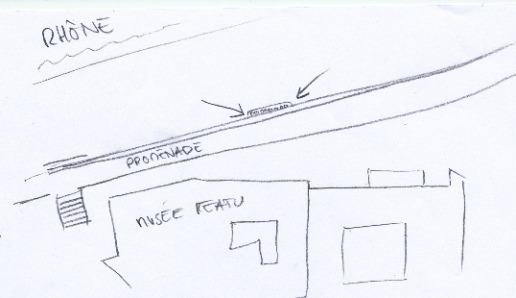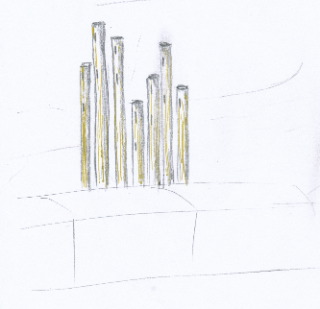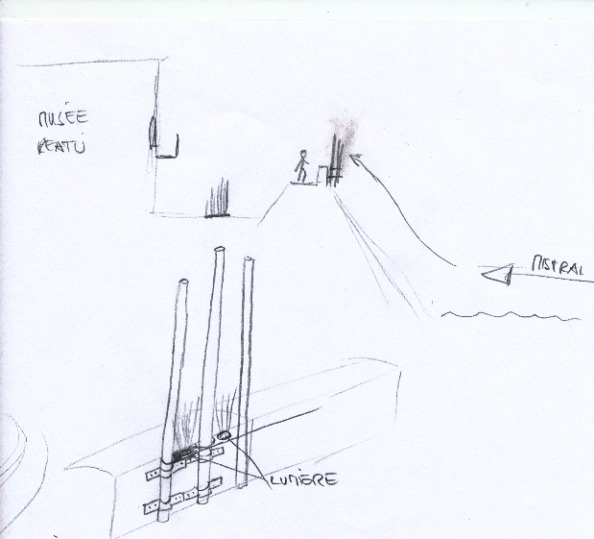No edit summary |
No edit summary |
||
| (2 intermediate revisions by the same user not shown) | |||
| Line 3: | Line 3: | ||
[[File:Windorgelgeruestton.MP3]] | [[File:Windorgelgeruestton.MP3]] | ||
[[File: | [[File:Geruest.jpg]] | ||
Thoughts and place: | |||
The mistral-Wind follows the stream of the Rhone and in the curve in front of the musee reatu it breaks out and hits the cities pier. The sculpture marks that significant point and sets a visual and tonal sign. Here it becomes a connector between the Rhone, Mistral and the musee reatu. But almost more significant, it becomes a connector between the public space of the city and the Musé Reatu, which holds parts of the cities culture. | The mistral-Wind follows the stream of the Rhone and in the curve in front of the musee reatu it breaks out and hits the cities pier. The sculpture marks that significant point and sets a visual and tonal sign. Here it becomes a connector between the Rhone, Mistral and the musee reatu. But almost more significant, it becomes a connector between the public space of the city and the Musé Reatu, which holds parts of the cities culture. | ||
Form and material | [[File:orgue_plan.jpg]] | ||
Form and material: | |||
For the construction simple Aluminum-tubes get used as they get for scaffolds. They get lined up with a little space in between so they remind on a fence on the border between the Rhone and Arles. Little slots on the side of the tubes make them work as an organ in combination with the wind. With its sounding ability its connecting character gets underlined because sounds is equally on both sides of the “fence”. | For the construction simple Aluminum-tubes get used as they get for scaffolds. They get lined up with a little space in between so they remind on a fence on the border between the Rhone and Arles. Little slots on the side of the tubes make them work as an organ in combination with the wind. With its sounding ability its connecting character gets underlined because sounds is equally on both sides of the “fence”. | ||
Color | [[File:orgue.jpg]] | ||
Color: | |||
The tubes are golden which stands for the warmth of this place and its special color of the light which is so characteristic for the region. In the nighttime light keeps the memory of that light awake. | The tubes are golden which stands for the warmth of this place and its special color of the light which is so characteristic for the region. In the nighttime light keeps the memory of that light awake. | ||
Interaction | Interaction: | ||
The single tubes are revolving so the wind-slot can be measured out of the wind stream on therewith be turned on and off. Everyone passing can play the organ and set his own chords. | The single tubes are revolving so the wind-slot can be measured out of the wind stream on therewith be turned on and off. Everyone passing can play the organ and set his own chords. | ||
Lights | [[File:orgue_position.jpg]] | ||
Lights: | |||
In between the tubes waterproof halogen-lights gets installed so they give light along the tubes. The power supply could get combined with the city-lights. | In between the tubes waterproof halogen-lights gets installed so they give light along the tubes. The power supply could get combined with the city-lights. | ||
Latest revision as of 09:33, 12 April 2010
On our visit in Arles last autumn I found that scaffold on the pier of the Rhone, that got used as an organ by the mistral-wind. Versatile sounds and chords came up and got mixed with cities and natures sounds. This simple idea is the basis for the sound-sculpture “sept ponts d´or”.
Thoughts and place:
The mistral-Wind follows the stream of the Rhone and in the curve in front of the musee reatu it breaks out and hits the cities pier. The sculpture marks that significant point and sets a visual and tonal sign. Here it becomes a connector between the Rhone, Mistral and the musee reatu. But almost more significant, it becomes a connector between the public space of the city and the Musé Reatu, which holds parts of the cities culture.
Form and material:
For the construction simple Aluminum-tubes get used as they get for scaffolds. They get lined up with a little space in between so they remind on a fence on the border between the Rhone and Arles. Little slots on the side of the tubes make them work as an organ in combination with the wind. With its sounding ability its connecting character gets underlined because sounds is equally on both sides of the “fence”.
Color:
The tubes are golden which stands for the warmth of this place and its special color of the light which is so characteristic for the region. In the nighttime light keeps the memory of that light awake.
Interaction:
The single tubes are revolving so the wind-slot can be measured out of the wind stream on therewith be turned on and off. Everyone passing can play the organ and set his own chords.
Lights:
In between the tubes waterproof halogen-lights gets installed so they give light along the tubes. The power supply could get combined with the city-lights.



